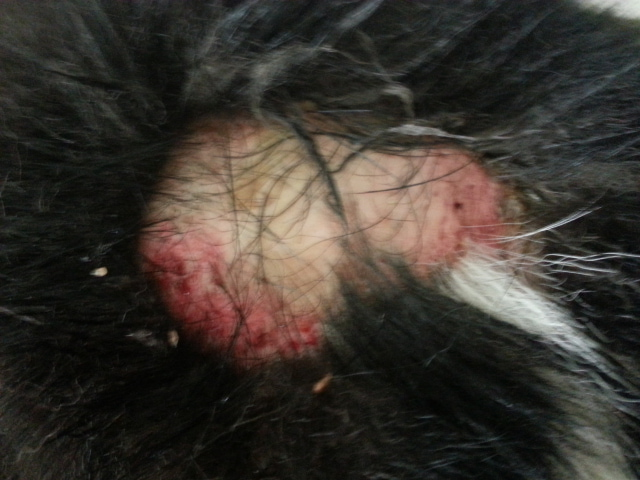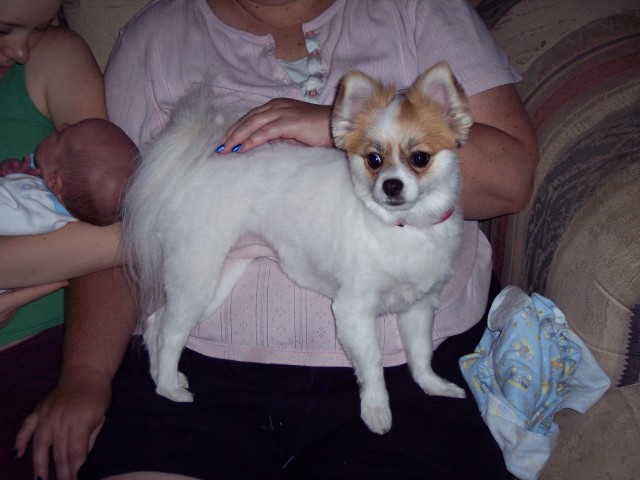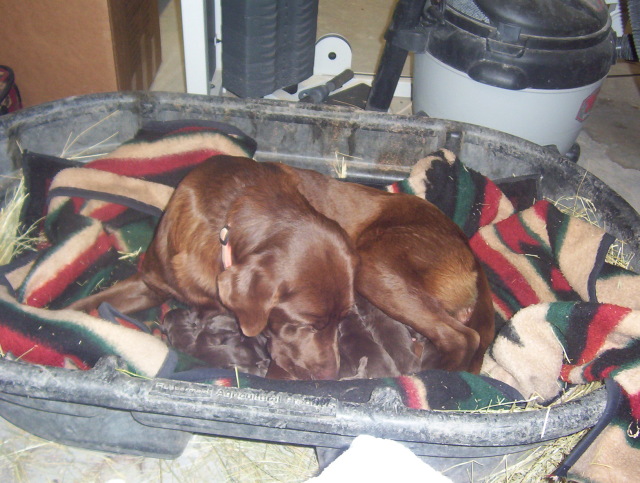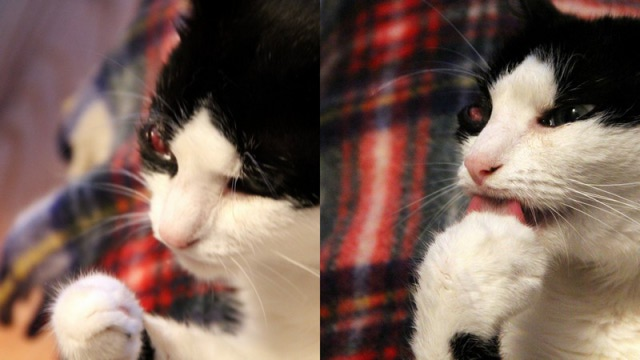Question
 Spooky
Spooky
Hi Jana -
I am stumped by my five year old DSH neutered male cat. Spooky is large ... probably 13 pounds ... and he will vomit up undigested food about once or twice a week. I feed him kibble food. I had him on Purina One for sensitive systems for years but recently have been experimenting with different foods. Since I have three cats total, I'm trying not to go broke feeding them. I am disappointed to read many "high end" foods with ingredients like corn, corn meal and poultry by products as the first three ingredients ... just like the cheaper brands do. I have fed them canned food before but the vomiting still existed but it seemed like it was less frequent. Is it normal for cats to do this sort of vomiting or should I cowboy up and let my vet run some tests?
Thanks so much for your input!!
Judi
AnswerDoes he vomit right after he eats? Vomiting of whole food usually depicts regurgitation issues, not gastro-intestinal ones. What your cat does is not uncommon at all, however, and certain cats seem to be more inclined to do this than others. Believe or not, some cats are actually bulimic and if they see another cat with food they think they might not get, they will vomit up what they have eaten in order to eat the other cat's food. We witnessed this at the vet hospital with a cat that the vet owned. Many causes of vomiting in cats are: digestive disorders from illness, food intolerances, ingredients that irritate, size and shape of food, dyes, etc. Some cats vomit from nerves, too many cats in the house, or changes in diet made too often. Giving new foods every few weeks or months can exacerbate this problem.
High end foods may use corn meal and poultry by products but you need to have a better understanding of what that means between companies. Most pet food companies, higher-end ones included such as Iams, do not used fixed formulation for their products.What that means in a nutshell is that most food used in the cooking of the food is from whatever was on the docks that day on sale. They do not use USDA inspected ingredients nor are they ingredients that you would eat yourself.
Corn is a high-protein, low allergen food. The kind of corn used in pet food is generally field corn, also known as maize, which differs from table corn like we eat. It has been used in pet foods and for livestock for years. Once it is cooked properly and ground up, it is highly digestible and a good source of protein, essential fatty acids, vitamin E and adds highly digestible carbohydrates for energy.
Poultry by-products sound terrible but what are they really? By-products are something that are produced by making something else, such as gelatin which is a by product of the beef industry. By-products used in some foods are bone meals, which are too high in phosphorus and harmful to pets. Hill's is one company that uses only livers, neck and back meat that is deboned so there is no bone meal added. Using by-products in this way adds nutrition without dangerous levels of phosphorus.
So unless you understand a lot about pet foods it is easy to misconstrue what the ingredients are. What most people don't know and aren't told is about ingredient splitting.
When you see a bag of cat or dog food that says the first ingredient is whole chicken, you are made to think that this food is really wholesome and full of good things. What you don't see, is that the second, third, fourth or fifth and possibly the eight ingredients are all grains. That seems okay since each is a small amount yes? Wrong.
If you were to take the actual weight and amount of all of the grains, be it rice, corn, rice gluten, etc. and added them up- you would see that the main ingredient is really carbohydrates and not chicken protein at all!!
This is just one of many tricks pet food manufacturers don't want you to know about.
Now back to your cat. As I said, one of the many causes of vomiting is food intolerance. I have five nutritional consultant certificates and one of the foods I will NEVER recommend to any one is anything made by Purina. The others are Pedigree and Alpo. Purina is a non-fixed formulation so whatever is cheap goes into the food. Hills is a fixed-formulation so they do not change their ingredients from batch to batch. As a result, their food is produced to not only provide optimal nutrition for your pets but a consistency you can trust.
I have used the Sensitive Skin formula on my daughter's cat and her skin and coat cleared up in about three weeks- which is how long it takes for a food to start to show on the outside.
So I would throw out all the other food and get this cat onto the Sensitive Stomach formula by Science Diet and see how he does. It may seem to cost more at the outset but this food will save you a lot of money because if you feed it according to package directions, they will require very little food and it lasts longer than the so-called cheaper brands.
Give it a try with your cat. If he is still vomiting after a week or two then it's time to get him to the vet. If not, see how he does for three weeks. If there is no change, take the empty bag back and get your money back. It's 100% guaranteed.
Now there are other issues to think about. Disorders of the esophagus can cause vomiting also. He does not appear to be overweight so that is not an issue. Kidneys can also cause vomiting, but rarely with food. So those are other things to consider.
Please let me know how he does in a few weeks.


 German shepherd skin issue please help
Question
back side back and tail
It start
German shepherd skin issue please help
Question
back side back and tail
It start
 Runny stool, vomiting,
Questionour Pom "Snoball"
QUESTION: Ou
Runny stool, vomiting,
Questionour Pom "Snoball"
QUESTION: Ou
 lactating dog
QuestionQUESTION: I am concerned with our 2 year old la
lactating dog
QuestionQUESTION: I am concerned with our 2 year old la
 Stinky Cat
QuestionHi Marie,
I work with a dog/cat rescue in my a
Stinky Cat
QuestionHi Marie,
I work with a dog/cat rescue in my a
 Cat Eye Infection/Cancer
Question
Eye Infection
You should know that my 9
Cat Eye Infection/Cancer
Question
Eye Infection
You should know that my 9